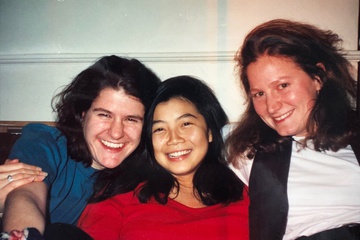I would like to see a new kind of teen girl feature film. A movie in which the girls-getting-ready-for-the-party scene isn’t preliminary to the action, or the lazy insert meant to communicate to the viewer, “These people are frivolous!,” but the rich and long-awaited conclusion. Or would it be asking too much for it to be the plot of the feature itself?
I was sitting in my final lecture of fall semester and thinking about cutting my hair short, maybe five inches off. When I walked out of the lecture hall I felt the surreal quality of something ending and the serious evaluation that follows. I ran into my friend whom I saw was also having a moment — he said, “I’m thinking about disappearing for a week or so.” And I nodded at him because I knew what he meant but this seemed melodramatic, and replied, “I think I’m just going to ask Te to cut my hair.” This act of grooming felt consequential enough.
I called my friend Te and within a few minutes I was in the chair in her dorm room where she has established her salon. She’s become great at a craft she can give away and she asks for nothing in return. The setup of her room itself connotes benevolence and warmth. The door is perpetually unlocked and we sit cross-legged. The girls who live here push the beds together. It’s a type of feminine infrastructure, a commons without tragedy.
I’ve been thinking about what Kristin Dombek wrote in her essay Letter from Williamsburg, “I… did what I’ve only ever done in secret, that is, away from the world of men.” Her words strike me as especially relevant to our cultural moment, given one purported objective of the #MeToo movement: to give the world (which always means the world of men) a window into the world of women. Those of us who are not men were actors in a secret world. But now we are talking in front of men in the same way we’ve talked forever “in secret.”
What else happens in this secret world? In Te’s room, we listen to music and talk about one another’s problems. We talk about boys, but not that much. And we get ready for parties. When my friends and I groom one another—for fun, for love, to look good, to burst with life, to scrub out every goo-hair-flake-scab, everything languid or dead—things are at odds. Our actions within this feminine infrastructure at once bolster it and prepare us to leave it behind.
Grooming among women demands answers for the same questions the self-care movement has to wrangle with (minus the question of immigrant labor providing the care, which is a big one). For whom do we groom? There’s no way of painting ourselves sweet-water cherry-mouth pretty that forgets completely about the world of men. The advice of feminist writer Jessa Crispin by way of Jezebel: “Just say that!... You can have two conflicting ideas. You can want to be fuckable and you can want to destroy the patriarchy. I have this same conflict. Everyone does.”
Which is what makes getting ready for parties, in particular, a complicated act. The aforementioned #MeToo-as-window-into-the-world-of-women metaphor, like every good metaphor, obscures quite a bit. Each story a woman tells does not just open a curtain to reveal indiscriminately whatever passes by. Both this processing of stories and this grooming before a party create a liminal space, a process that takes place between worlds. Both involve an effort of care, work, performance, and reservation. These are the moments when we are neither in the world of men nor wholly outside of it. We are preparing ourselves to enter that world. We do it physically, and we do it logistically, in the form the contingency plans we make just in case something bad were to happen—when going to a party feels akin to embarking on a dangerous mission.
And in this limbo we move in two directions: this intense engagement with exteriority that shepherds us outward also pulls us deeper inward. It gives way to the interiority of our girlfriends.
If you have seen a video of snow monkeys picking fleas out of each other’s coats, you know that they are awkwardly frenetic and warm and hold each other’s faces flat in their palms and will not let go until the last bug is gone. A Public Broadcasting Service special on the subject narrates the act, “In a community that depends upon one another for survival, grooming is the glue that binds the troupe together.”
In my favorite example of this union, Te and our friend Jacqueline used to shower in adjoining stalls most nights. This unguarded state gradually disassembled every barrier on the way to closeness. One night, before getting in, Te and Jacqueline talked for an hour outside the shower (it was not running) — and they loved each other so much — and Jacqueline felt in the pit of her stomach that she had to talk to Te. She was so excited to tell her everything.
— Magazine writer Eva K. Rosenfeld can be reached at eva.rosenfeld@thecrimson.com. This is the first installment of her column, The Girls Want To Be With The Girls, which will explore female communities on campus.



